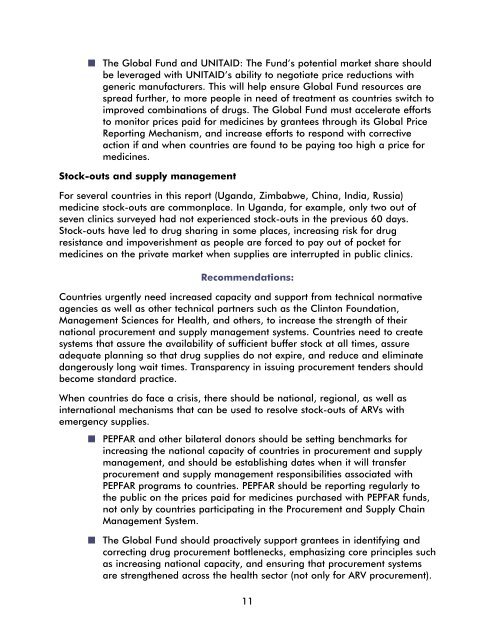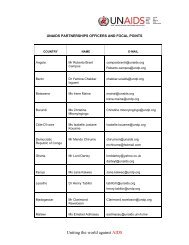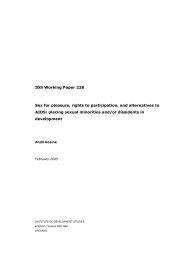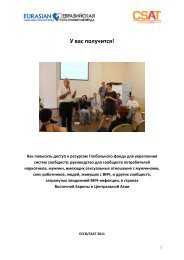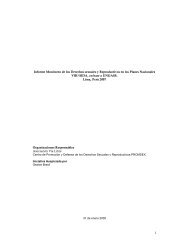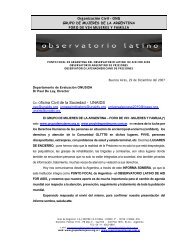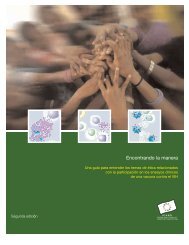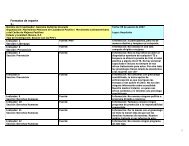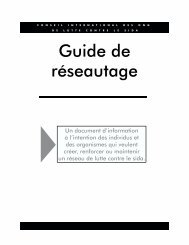Missing the Target #5: Improving AIDS Drug Access ... - CD8 T cells
Missing the Target #5: Improving AIDS Drug Access ... - CD8 T cells
Missing the Target #5: Improving AIDS Drug Access ... - CD8 T cells
You also want an ePaper? Increase the reach of your titles
YUMPU automatically turns print PDFs into web optimized ePapers that Google loves.
The Global Fund and UNITAID: The Fund’s potential market share shouldbe leveraged with UNITAID’s ability to negotiate price reductions withgeneric manufacturers. This will help ensure Global Fund resources arespread fur<strong>the</strong>r, to more people in need of treatment as countries switch toimproved combinations of drugs. The Global Fund must accelerate effortsto monitor prices paid for medicines by grantees through its Global PriceReporting Mechanism, and increase efforts to respond with correctiveaction if and when countries are found to be paying too high a price formedicines.Stock-outs and supply managementFor several countries in this report (Uganda, Zimbabwe, China, India, Russia)medicine stock-outs are commonplace. In Uganda, for example, only two out ofseven clinics surveyed had not experienced stock-outs in <strong>the</strong> previous 60 days.Stock-outs have led to drug sharing in some places, increasing risk for drugresistance and impoverishment as people are forced to pay out of pocket formedicines on <strong>the</strong> private market when supplies are interrupted in public clinics.Recommendations:Countries urgently need increased capacity and support from technical normativeagencies as well as o<strong>the</strong>r technical partners such as <strong>the</strong> Clinton Foundation,Management Sciences for Health, and o<strong>the</strong>rs, to increase <strong>the</strong> strength of <strong>the</strong>irnational procurement and supply management systems. Countries need to createsystems that assure <strong>the</strong> availability of sufficient buffer stock at all times, assureadequate planning so that drug supplies do not expire, and reduce and eliminatedangerously long wait times. Transparency in issuing procurement tenders shouldbecome standard practice.When countries do face a crisis, <strong>the</strong>re should be national, regional, as well asinternational mechanisms that can be used to resolve stock-outs of ARVs wi<strong>the</strong>mergency supplies.PEPFAR and o<strong>the</strong>r bilateral donors should be setting benchmarks forincreasing <strong>the</strong> national capacity of countries in procurement and supplymanagement, and should be establishing dates when it will transferprocurement and supply management responsibilities associated withPEPFAR programs to countries. PEPFAR should be reporting regularly to<strong>the</strong> public on <strong>the</strong> prices paid for medicines purchased with PEPFAR funds,not only by countries participating in <strong>the</strong> Procurement and Supply ChainManagement System.The Global Fund should proactively support grantees in identifying andcorrecting drug procurement bottlenecks, emphasizing core principles suchas increasing national capacity, and ensuring that procurement systemsare streng<strong>the</strong>ned across <strong>the</strong> health sector (not only for ARV procurement).11


